Hi.
Can you spell T-E-R-R-I-F-I-E-D?
I can.
Cause I'm about to put my latest script("Lure of the Fox") in front of a bunch of my peers for a Closed Amateur Table Read.
What is a Closed Amateur Table Read, you ask? It's when the script you have slaved over for doesn't matter how long finally gets read by (hopefully) a group of very supportive friends.
For the First Time.
Out Loud.
And then--if all goes according to plan--it gets shredded within an inch of it's life and you take the pieces and start all over again.
Also known as Revision.
Yay?

The good news is that it's not a professional read, so there are no financiers or audience members in the room in case I happen to make a Big Social Gaff.
Which I am sometimes wont to do(thank you ADD😛).
I've done a couple of these Table Reads now both in academic and other amateur settings as both an actor and at playwright; and there are ways to make them successful and ways to make them....suck.
So this week it's about the Good, the Bad and the Ugly of Table Reads, complete with my dorky little anecdotes. Some of them apply to all Table Reads, some are just personal preferences, cause that's how I roll!
"Do"s and "Don't"s of a Table Read(According to This Theatre Artist)
DO:
DO Plan Ahead
When I was a theatre major, I had a group of people that I could usually snag for a quick read like a week in advance and then we'd get together in an empty classroom to read the script. That, or we'd read the script as part of a class assignment(like in New Script Workshop or something).
That is not the case outside of school.
We all have busy lives: day jobs, families, social-obligations-outside-of-the-theatre, etc.; so when you're going to do a reading of your script, create an event on Facebook, or in Eventbrite, or Meetup or whatever and invite people to see who happens to be available.
My highest success rate is when I do it a month in advance at least. If you're really lucky, you can do it a week in advance, but chances of success are super slim.
At least in my experience.
DO Send Out the Right Script
I'm not kidding.
Double check and triple check that everyone has not only the right script, but the right draft of the script before the reading takes place.
The first Table Read I ever had was my second year as a theatre major, so it was part of a class assignment.
I got my actors together, scheduled my time-slot, showed up to class with notebook and pen and ready to take notes and get feedback.
And the actors started to read.
And a few of them looked really confused.
And after about fives minutes, one of my actors said "um, I think I have the wrong script." And another actor said "yeah, me too".
Guess what?
I'd sent out three different drafts.

As far as I can tell, what happened was that each time my actor friend said yes to coming to my class, I'd sent out what I thought was a copy of my current draft.
Except each time, I'd made changes to the previous draft as saved that one instead.
And now the whole class knew about it.
Can you spell M-O-R-T-I-F-I-E-D? I can.
Once you send out your script to the actors leave it alone. Save it as a PDF if you have you, so that you don't even have the temptation.
DO Your Homework
If you're the playwright/screenwriter your homework is making sure that the script gets sent out on time(say 3-7 days before the reading) and compiling a set of questions(mental or otherwise) that you can potentially ask. If you trust the actors enough, you can even send the questions to them ahead of time so that they are thinking about their answers while reading the script.
If you don't have any specific questions(I usually start my post reading Q&A Session by saying something like "shred me!"), be prepared to answer questions that will be asked by the other actors.
You will get them.
I promise.
And it's ok to say "I don't know". That's a clear signal that there is some revision that needs to happen, which is always a good thing.
If you are an actor the first part of your homework is the read the script beforehand, if you have time. Even if all you read is stage/camera directions and scene headings.
I'll say that again.
Read the script beforehand if you have time.
Even if all you read is stage/camera directions and scene headings.
Understanding writers will know that your world doesn't revolve around their reading.
But if the writer is anything like me, they will get the impression that a particular line of dialogue that was stumbled over is clunky and needs revision, when maybe the only reason the actor stumbled is because he/she/they hadn't read the script before the reading.

There is nothing more frustrating than stumbling over lines that you haven't read before.
You have other obligations.
We get that.
And that's ok. We're all busy. But if you have time, it's better in the long run.
The second part of your homework only applies if you got questions from the writer beforehand.
Read those questions.
Apply those questions to the script.
Have answers so that you can provide them when needed.
Homework isn't as big a deal in closed amateur settings, but in the professional world, if it's clear you slack off, you could get fired. So practice homework now for professionalism later.
DO Provide Sustenance
Every single reading I have had outside an academic setting, I've made everybody food.
Sometimes it's a full meal, sometimes it's just cake(I love cake!!).

People might bring water bottles cause they talk so much(scripts are full of dialogue after all), but energy can sap even when all you do is read, and water doesn't replenish energy.
Like at all.
You don't have to host a formal dinner while you read, but it's totally ok to break in between acts(which is much easier in a play script than a screenplay) to allow your actors to replenish and refill. This will prevent burnout--which is a thing even at readings.
Also, it's a great way to thank people for helping you out without breaking the bank.
(Quick Note: when you do this, it's best to stick to Actors Guild/SAG Break Rules: 10 minutes break for every 80 minutes of rehearsal time just so you don't go over your allotted reading time)
DON'T:
DON'T Read it Just to Read It
Several times in academic settings, I participated in readings where the author came in, we read the script, they said "thank you" and walked out.
No feedback, no nothing.

Call me crazy, but find this unproductive.
In my book, you hold a reading not just so you can hear it out loud, but also so that you can improve your work. If all you wanted was to read it, then why didn't you do it yourself?
Hold a reading because you want to, not just because you need to.
Saves everybody a headache.
DON'T Ignore Feedback And/Or Be Offended
Guess what?
Everybody has opinions. Everyone. If they don't they ain't human.
Part of a reading is the giving and receiving of feedback, also known as readers expressing opinions of what can be stronger, what makes no sense, and what should be thrown out the window.
And while you should take everything said with a grain of salt (because sometimes the feedback is either pure opinion or the "you can't write so I'm going to write it for you" variety), there are still things you need to do in the feedback stage of the Table Read:
Write down every single thing that is said.
I'm serious.
Write it down.
Think about it.
Let is stew.
Then go back and delete the things that are pure nonsense--because there's going to be those types of notes.

Getting feedback hurts sometimes. It's like lying your baby naked in front of hungry machete wielding cannibals and saying "have at it". They don't hold your script in the same type of esteem that you--the writer--do. That doesn't mean that they hate you, or the script. It means they respect you and want to help you improve.
(there are those very rare times when people say things that are deliberately unhelpful because either they have a participation grade riding on this or they're just maddeningly unhelpful grumpy people but I can count the number of times this has happened to me on the fingers of one hand)
Things people say are gonna sting. They're killing your darlings. Because of course they are so that your script can get better.
Listen to what they say. Think about it. They want to help you.
DON'T Expect People to Bring Copies of the Script
This is nitpicky, but it happens.
We currently live in a world with laptops, cell phones, tablets--hundreds of thousands of ways that we can access digital files. Sometimes actors will bring these digital files with them to read off their devices.
Other times, they won't(if it's a professional Table Read, it is your responsibility to provide all of the scripts for every single actor. Amateur readings have a little leeway).
My personal practice has been to have several copies of the script on hand for those actors who don't have copies with them--on my phone, my laptop, hard copies, whatever(if I'm feeling really generous, I'll even bind the hard copies so they look extra nice).
This will save time in the long run.
DON'T Go Over The Allotted Time
Best practice is to arrive on time or early to a reading.
But we are human.
There is traffic.
Our car dies.
Our watch stopped.
Previous engagement accidentally bled over.
We just plain forgot.
It happens.
Particularly in the Amateur Table Read.

So, be prepared to compensate for late-comers, but do your absolute best to start and end the reading on time.
If you said it would run three hours, the reading runs three hours.
Not three and a half.
Not three and fifteen minutes.
Three hours.
People have lives. Unless it's a professional gig, they are nice enough to be doing you a huge favor, so you are obligated to respect their time as much as they are respecting yours.
Readings are fun.
They are nerve-wracking.
They are part of a Theatre Artist's lifestyle. Follow the above "Do's and Don't's" and it'll be successful.
Now all I gotta do is get through mine.....

No comments:
Post a Comment